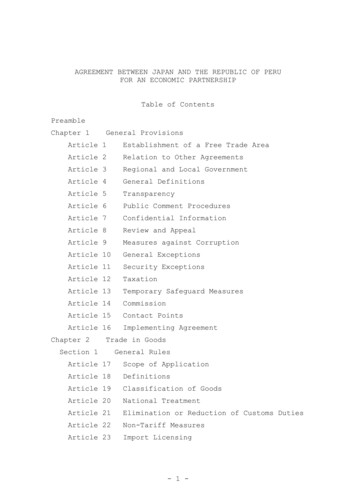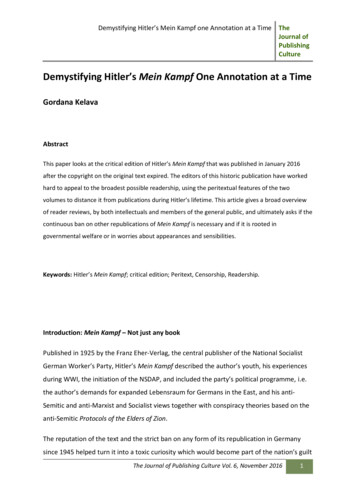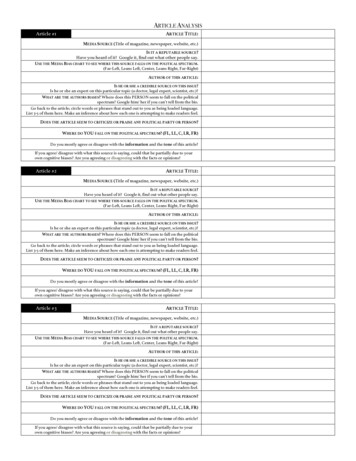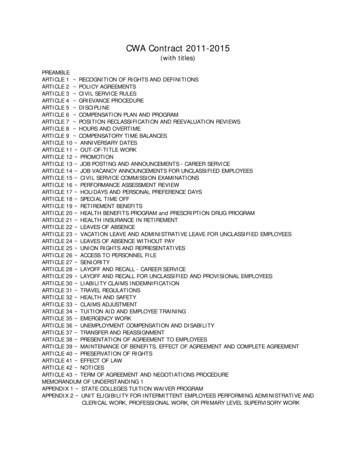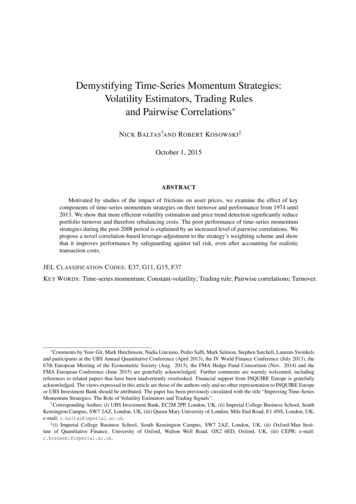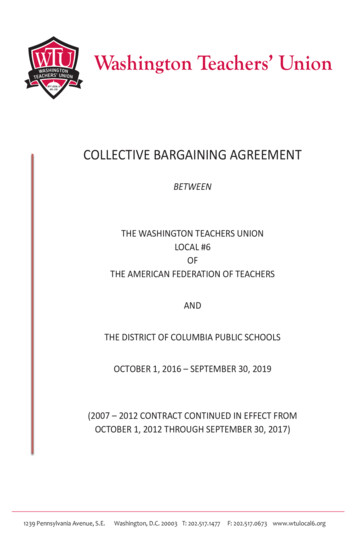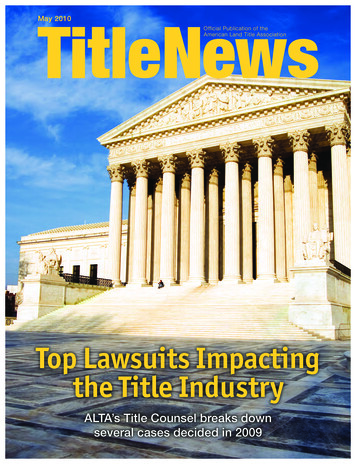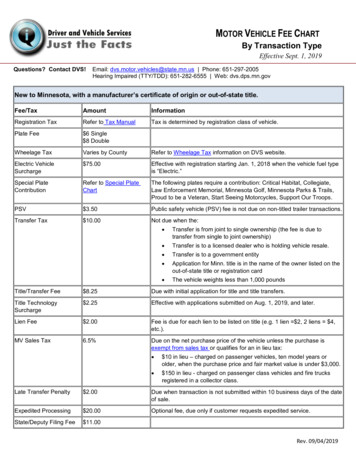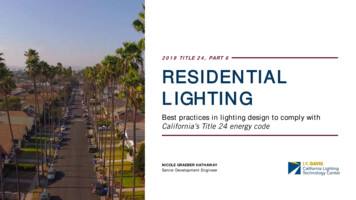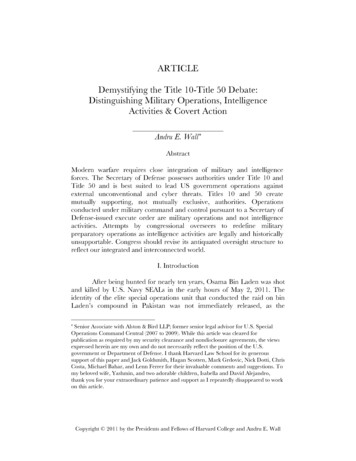
Transcription
ARTICLEDemystifying the Title 10-Title 50 Debate:Distinguishing Military Operations, IntelligenceActivities & Covert ActionAndru E. Wall*AbstractModern warfare requires close integration of military and intelligenceforces. The Secretary of Defense possesses authorities under Title 10 andTitle 50 and is best suited to lead US government operations againstexternal unconventional and cyber threats. Titles 10 and 50 createmutually supporting, not mutually exclusive, authorities. Operationsconducted under military command and control pursuant to a Secretary ofDefense-issued execute order are military operations and not intelligenceactivities. Attempts by congressional overseers to redefine militarypreparatory operations as intelligence activities are legally and historicallyunsupportable. Congress should revise its antiquated oversight structure toreflect our integrated and interconnected world.I. IntroductionAfter being hunted for nearly ten years, Osama Bin Laden was shotand killed by U.S. Navy SEALs in the early hours of May 2, 2011. Theidentity of the elite special operations unit that conducted the raid on binLaden's compound in Pakistan was not immediately released, as the* Senior Associate with Alston & Bird LLP; former senior legal advisor for U.S. SpecialOperations Command Central (2007 to 2009). While this article was cleared forpublication as required by my security clearance and nondisclosure agreements, the viewsexpressed herein are my own and do not necessarily reflect the position of the U.S.government or Department of Defense. I thank Harvard Law School for its generoussupport of this paper andJack Goldsmith, Hagan Scotten., Mark Grdovic, Nick Dotti, ChrisCosta, Michael Bahar, and Lenn Ferrer for their invaluable comments and suggestions. Tomy beloved wife., Yashmin, and two adorable children, Isabella and David Alejandro,thank you for your extraordinary patience and support as I repeatedly disappeared to workon this article.Copyright C 2011 by the Presidents and Fellows of Harvard College and Andru E. Wall
2011 /Demysti/ing the Title 10- Title 50 Debate86operation was described as covert. Yet as rumors swirled and informationleaked to the media, Leon Panetta, the head of the Central IntelligenceAgency (CIA) and soon-to-be-head of the Department of Defense (DoD),clarified during an interview that the operation to kill or capture bin Ladenwas a "Title 50" covert operation. Panetta explained that the raid wascommanded by the President through Panetta, although "the realcommander" was the head of Joint Special Operations Command, ViceAdmiral William McRaven-the on-scene commander "actually in chargeof the military operation that went in and got bin Laden."IPanetta's description of the bin Laden raid as a covert "Title 50"operation with a chain of command that included military commanders andthe Director of Central Intelligence renewed a long-simmering debatewithin the national security community over "Title 10" and "Title 50"authorities. Titles 10 and 50 are part of the U.S. Code, but why wouldPanetta invoke a statute, the legal authority, to explain who was in charge ofan operation conducted by military forces? We will see in a moment that theanswer has everything to do with an antiquated congressional oversightparadigm and little to do with actual legal authorities.The Title 10-Title 50 debate is the epitome of an ill-defined policydebate with imprecise terms and mystifying pronouncements.2 This is adebate, much in vogue among national security experts and military lawyersover the past twenty years, where one person gravely states "there are somereal Title 10-Title 50 issues here," others in the room nod affirmatively, andwith furrowed brows all express agreement. Yet the terms of the debate aretypically left undefined and mean different things to different people. If youI Transcript available at http://www.pbs.org/newshour/bb/terrorism/janjun11 /panetta 05-03.html (last visited Sept. 8., 2011).2 Admiral Vern Clark, former Chief of Naval Operations of the U.S. Navy, ProfessorJohnRadsan, a former assistant general counsel for the CIA, and Professor Gregory McNeal, aformer Department ofJustice lawyer., were asked "what is Title 10 authority?" and "what isTitle 50 authority?" during a panel discussion at a law school symposium on nationalsecurity law. Admiral Clark phrased the debate as one "about the line between covert andovert" (an issue we will examine in Part IV of this paper), yet his articulation of this concernfocused on military transparency and public perceptions about the military. ProfessorRadsan framed the debate in terms of defined roles for the military and intelligencecommunities, while Professor McNeal opined that military lawyers advising specialoperations forces are often confused about the legal basis for their actions. NationalSecurity Symposium: 7ie Battle Between Congress & he Cotirts in the Face ofan UnprecedentedGlobal 7lreat: Legislation Panel: Discussion & Conmmentay., 21 REGLNT U.L. RLV. 331, 347(2009) [hereinafter "National Security Symposium"].
HarvardNational Security Journal/ Vol. 387ask four military lawyers or DC policy wonks to define what "Title 10-Title50 issues" means, you could get four different answers each cloaked inanother layer of ambiguity, intrigue, and ignorance.The Title 10-Title 50 debate is essentially a debate about the properroles and missions of U.S. military forces and intelligence agencies. "Title10" is used colloquially to refer to DoD and military operations, while "Title50" refers to intelligence agencies, intelligence activities, and covert action.3Concerns about appropriate roles and missions for the military andintelligence agencies, or the "Title 10-Title 50 issues" as commonlyarticulated, can be categorized into four broad categories: authorities,oversight, transparency, and "rice bowls." 4 The first two concerns,See, e.g., comments by James A. Lewis of the Center for Strategic and InternationalStudies:You have intelligence authorities, Title 50, and you have militaryauthorities. Title 10. Well, what does the commander of CyberCommand do? Does he get to pick and choose between them? You needsome way to say, "This kind of thing is military, you have to use themilitary decision chain," versus., "this kind of thing is intelligence, youhave to use the intelligence decision chain." I'm not sure they've workedthrough all of that.Interview by Greg Bruno withJames A. Lewis, Director., Techn. & Pub. Policy Program,Ctr. for Strategic & Int'l Studies, (Dec. 28, 2009), available g-us-cybersecurity.html?breadcrumb %2Fbios%2Fl 3554%2Fgreg bruno.is a term commonly used by government lawyers and military personnel todescribe statutory and delegated powers. For example, Title 10 of the U.S. Code createdthe Office of the Secretary of Defense and assigned the Secretary of Defense all "authority,direction and control" over DoD, including all subordinate agencies and commands. 10U.S.C. § 113(b). Title 10 later created U.S. Special Operations Command (USSOCOM)and lists several tasks or missions that USSOCOM "shall be responsible for, and shall havethe authority to conduct." 10 U.S.C. § 167. The President, in his role as Commander inChief, may delegate through the Secretary of Defense additional responsibilities or"authorities" to USSOCOM, just as the Secretary of Defense may delegate certain of hisstatutory authorities to USSOCOM. These statutory and delegated responsibilities fallunder the general rubric of "authorities." If the Commander of USSOCOM wants toconduct a given activity, he must first determine whether he possesses the statutory ordelegated authority to use assigned personnel and resources to conduct the activity inquestion. Double-Tongued Dictionary defines "rice bowl" as: "in the military, a jealouslyprotected program, project, department., or budget; a fiefdom. Etymological Note: Perhapsrelated to the Chinese concept of the rice bowl as a metaphor for the basic elementsrequired to live, as seen, for example., in the iron rice bowl, employment that is guaranteedfor life." Dictionary definition of "rice bowl", DOUBLL-TONGULD DICTIONARY,4"Authorities"
2011 /Demystiing the Title 10- Title 50 Debate88authorities and oversight, are grounded in statutes and legislative historyand are the focus of this article. The second two concerns, transparency and"rice bowls," can be quickly identified and dismissed as policy argumentsrather than legitimate legal concerns.Before delving into the law, we must first dismiss the policy argumentsmasquerading as Title 10-Title 50 issues. Transparency is the mostamorphous concern in the Title 10-Title 50 debate. Often unacknowledged,the essence of this concern is the belief that intelligence operatives live in adark and shadowy world, while military forces are the proverbial knights onwhite horses.? Advocates of military transparency want to ensure thereputation of America's men and women in uniform remains untarnishedby association with the shadowy world of espionage. 6 For these people, theTitle 10-Title 50 debate is a debate about whether military forces should beengaged in "secret operations" or "go over to the dark side." 7 Because onary/rice bowl (last visited Feb. 9,2010). For an example of usage., see "Gingrich pledged 'to cooperate in any way I can on abipartisan basis in really rethinking all of this' because the effort is 'going to require notonly reshaping the rice bowls at the Pentagon but breaking a few of them."' Fred Kaplan,In House, BipartisanDrive is Growing to Slasi Defense, BOSTON GLOBL,Jul. 29, 1990, at 2. Seealso "Attempting to take the moral high ground in a debate that in the past has beencharacterized by high emotions as each service sought to protect its own 'rice bowls."' AinlySeeks Moral High GroundIn Briefing to Roles Panel, 184 DLFLNSL DAILY 53 (Sept. 15, 1994).- The U.S. military consistently ranks at the apex of most-trusted institutions in the UnitedStates. This trust is critical to America's all-volunteer military and some even suggest thetrust disparity between Congress and the military is one reason why Congress is loath topublicly attack military policies. David Hill, Respectfor Military Stuges, THL HILL Jul. 18,2006), 251-respect-for-military-surges.A 2009 Gallop poll found 82% of Americans have a "great deal" or "quite a lot" of respectfor the U.S. military, versus only 17% who felt the same way about Congress. Lydia Saad,Congiess Ranks Last in Confidence in Institutions.,GALLOP July 22., anks-last-confidence-institutions.aspx.LIn the words of Admiral Clark:This line that exists [between covert and overt] is part of our goodstanding in the world. We have carefully tried to keep the military out ofthe covert world . . The covert side has appropriately resided withinthe CIA. We want the citizens, when they look at men and womenwearing the cloth of the nation, to know that is who they are.National Security Symposium, supra note 2., at 347.7 "Secret operations" includes both covert and clandestine operations, which are terms thisarticle will explore in greater detail in Parts III and IV. Professor Robin Williams argues"our cultural values do greatly affect our willingness as a nation to engage in
89HarvardNational Security Journal/ Vol. 3operations (used here in the colloquial sense that includes covert andclandestine operations) often require operating out of uniform, there arealso concerns that military forces conducting such operations could loseprotections under the Geneva Conventions (e.g., treatment as prisoners ofwar rather than as spies), increase risks to all U.S. military personnel servingabroad, and possibly endanger morale by sacrificing what is viewed as themoral high ground.8The second policy argument can be colloquially described as the"rice bowls" concern, which employs military jargon to describe those whojealously guard assigned programs, resources, and responsibilities. 9Bureaucrats jealously protect their "rice bowls" for two main reasons: tostrengthen their position in the competition for scarce resources and topreserve their "lanes" or operational primacy in a given area. Broadlyspeaking, proponents of the "rice bowls" concern contend that Title 50 andPresidential orders make the CIA the lead U.S. agency for the collection ofhuman intelligencelo and conduct of covert action, yet the military isunconventional warfare and do affect our policies and strategies in dealing with thewidespread threats posed by infiltration and subversion on the part of hostile powers inmany parts of the world." Robin M. WilliamsJr., Are Americans and Thleir Cdtial ValuesAdaptable to the Concept and Techniques of Unconventional Wafare?, 341 ANNALS AM. ACAD.POL.& SOC. SCi. 82, 83 (1962), availableat http://www.jstor.org/stable/ 1034146. ProfessorWilliams suggests that "many Americans have come to think of unconventional warfare .in connection with the premeditated use of deception., subversion, and terror" and, thus,view unconventional warfare as incompatible with American values.-Jennifer D. Kibbe, 7ie Rise of the ShadowIWarriors, 83 FORLIGN AFFAIRS 102, 113(March/April 2004), available athttp://users.polisci.wisc.edu/kinsella/Rise 0%o200f%20the%/o2Oshadow%/o20warriors.pdf.9 For a discussion of the term "rice bowls," see stpra note 4.l0 EXEC. ORDLR No. 12,333, 46 Fed. Reg. 59941 (Dec. 4, 1981), amended by EXLC. ORDERNO. 13,470, 73 Fed. Reg. 45,325 July 30, 2008) [hereinafter E.O. 12,333], and 50 U.S.C.§ 403-4a. During the Cold War, intelligence collection was organized by source and leadagency. The CIA was primarily responsible for human intelligence (HUMINT); theNational Security Agency (NSA) was primarily responsible for signals intelligence(SIGINT); and the National Geospatial Intelligence Agency was primarily responsible foroverhead imagery intelligence (IMINT). As one intelligence expert explains: "There was,perhaps., a certain logic to that organization during the Cold War. With one overwhelmingtarget-the Soviet Union-the various "INTs" were asked, in effect, what they couldcontribute to understanding the puzzle of the Soviet Union." GREGORY F. TRE\ERTON,INTELLIGLNCL FOR AN AGE OF TLRROR 6 (2009). Treverton points out that on the analyticside, this organization permitted competition., of sorts, as the CIA focused on the nationaland political aspects of intelligence., while the Defense Intelligence Agency and serviceintelligence elements "naturally focused more on military dimensions of problems that cutacross the military and political." Id. at 50. There is an ongoing debate over whether
2011 /Demystiing the Title 10- Title 50 Debate90stealing from the CIA's "rice bowl" by expanding its human intelligencecapabilities under the guise of Title 10 authorities. The belief is that thisexpansion by the military threatens to divert resources from the CIA andcould lead to operational deconfliction issues.1 1 For the CIA and itsCongressional proponents, the concern is that the CIA's legal role as leadagency is diminished as it is dwarfed in size by the military's rapidlyexpanding human intelligence capabilities.' 2 When budgets shrink andresources are scarce, the fear is the CIA will be disproportionately impacted.The related rice bowls concern of "lanes" raises actual operationalissues. If the military's human intelligence collection resources dramaticallyexceed the CIA's resources, the CIA may find it difficult to execute itsstatutory role as lead agency for the coordination and deconfliction of U.S.government human intelligence collection.' 3 A few hundred CIA officersmay find it impossible to coordinate and deconflict the human intelligenceactivities conducted by thousands of military personnel, thereby de factoceding the CIA's statutory primacy.' 4 In a worst-case scenario, the failure toorganizing intelligence collection in this manner remains appropriate to respond to thethreats of the 21st century.I1 To those on the CIA's side, human intelligence collection efforts would see "a quantumimprovement in capability" if "lanes" across the intelligence community were enforced.John MacGaffin, Clandestine Human Intelligence: Spies, Counterspies, and CoiertAction, inTRANSFORMING U.S. INTLLLIGLNCE 79, 91 Jennifer E. Sims & Burton Gerber, eds.,2005). The term "deconfliction" is commonly used in military and intelligence circles torefer to processes or coordination intended to ensure that various operations or activities donot interfere with each other.12The Pentagon's efforts to create a human intelligence capability separate from andseemingly parallel to the CIA's human intelligence capabilities is seen as encroaching "onthe CIA's realm." ALFRED CUMMING, CONGRLSSIONAL RESEARCH SLRVICL, COVLRTACTION: LLGISLATIVE BACKGROUND AND POSSIBLE POLICY QULSTIONS 3 (2009). See alsoEric Schmitt and Thom Shanker, Threats and Responses: A CIA Rival; Pentagon Sets UpIntelligence Unit, N.Y. TnIES, Oct. 24, 2002, at Al, available ence-unit.html.i During confirmation hearings for General Michael Hayden after he was nominated in2006 to become Director of the CIA, Senator Olympia Snowe opined that as the militaryseeks to "further expand and encroach in areas . . [such as] clandestine forces, payinginformants, gathering deeper and deeper into human intelligence, I think that this is goingto be a serious-potentially contest if the CIA does not regain its ground and reclaim itslost territory." Nomination of General Vichael V Hayden, USAF to be Directorof the CentralIntelligence Agency: HeaingBefore the S. Select Comm. on Intelligence., 109th Cong., 2nd Sess. 50(2006) [hereinafter Hayden Nomination].14 The DoD controls about 80% of the intelligence budget, which presumably only includesDoD agencies that are also part of the intelligence community; most of the 80% is spent on
91HarvardNational Security Journal/ Vol. 3maintain clear operational lanes could lead to operatives unintentionallyimpeding or even exposing each other's human intelligence efforts. Thesalient point, however, is not that the military is exceeding its statutoryauthority, but rather that both the military and intelligence agencies possessthe statutory authority to conduct intelligence-gathering activities that maybe indistinguishable "to the naked eye."'5 This is a valid operationalconcern and unremitting management challenge; intelligence agencies muststrive to ensure the military's intelligence collection activities arecoordinated, deconflicted, and conducted according to establishedstandards.None of these concerns suggest that a certain activity (or method ofconducting that activity) is inconsistent with statutory or legal authority;rather, each suggests that a certain activity ought not to be conducted (orought to be conducted) a certain way because of practical effects. Guardingthe U.S. military's reputation and protecting an agency's resources arelegitimate policy considerations, just as preserving lanes and ensuringdeconfliction is a crucial operational concern. Yet it is misleading to couchthese policy and operational debates in terms of statutory law, and it ismisleading to label these concerns as "Title 10-Title 50" issues.Transparency, rice bowls and lanes are concerns that can be adequatelyaddressed by sound Executive Branch management and proper allocation ofresources by Congress.Having defined the Title 10-Title 50 debate and summarily exposedthe policy arguments and operational challenges that often masquerade aslegal issues, this article now turns in Part II to analyzing the significant legalauthorities given to the President and Secretary of Defense under the U.S.Constitution and Titles 10 and 50 of the U.S. Code. That "Title 10" iscommonly used to refer to DoD and to articulate the legal basis for militaryoperations is understandable. However, the use of "Title 50" to refer solelyto activities conducted by the CIA is, at best, inaccurate as the Secretary ofDefense also possesses significant authorities under Title 50.spy satellites and overseas listening posts. Mark Mazzetti, Nominee PromisesAction as U.S.Intelligence Chief,N.Y. TIMESJul. 21, 2010, at A16, available intel.html.1) General Hayden correctly noted "that what DoD is doing under title 10 authorities andwhat CIA does under title 50 may be indistinguishable to the naked eye . . . get kind ofmerged so that the actions are actually on the ground., in reality indistinguishable, eventhough their sources of tasking and sources of authority come from different places." HaydenNomination, supra note 13, at 50-5 1.
2011 /Demysti/ing the Title 10- Title 50 Debate92After establishing the relevant legal authorities, Part III discussesCongressional oversight, which reveals itself as the true Title 10-Title 50issue. It is Congress's antiquated oversight structure and a concomitantmisunderstanding of the law that casts a shadow of concern and purportedillegitimacy over military operations that resemble activities conducted byintelligence agencies. Congress's stovepiped view of national securityoperations is legally incongruous and operationally dangerous because itsuggests statutory authorities are mutually exclusive and it creates concernsabout interagency cooperation at exactly the time in history when our policyand legal structures should be encouraging increased interagencycoordination and cooperation against interconnected national securitythreats.Concern over purported Title 10-Title 50 issues arises most often inthe context of discussions over unconventional and cyber warfare. Whilemost details of how these operations are conducted are not publiclyavailable, Part IV will define unconventional warfare and cyberwarfare andgenerally explain their purpose, role, and conduct. These militaryoperations are conducted in secret and in environments where publicacknowledgement of the U.S. military's involvement may raise diplomaticand national security concerns (e.g., other countries and cyberspace), whichis why Congressional intelligence committees often mistakenly concludethey should have oversight of these military operations. However, when thelaw (and even Congress's own legislative history) is applied tounconventional warfare and cyberwarfare in Part IV, it becomes apparentthat these are military operations rather than intelligence activities so longas they remain under the command and control of a military commanderand are conducted prior to or during (anticipated or actual) acknowledgedmilitary operations. Part V offers a few concluding thoughts andrecommendations.II. The Law Permits While Congress Attempts to RestrictThe Title 10-Title 50 debate is typically invoked to express concernsthat the military is taking over missions and activities "properly" within thesole domain of the intelligence agencies. While ordinary Americans in theheartland may care only that U.S. national security objectives are effectivelyaccomplished, military and intelligence bureaucrats and their Congressionaloverseers remain obsessed with who actually does the mission. Yet a careful
HarvardNational Security Journal/ Vol. 393analysis of the law and related legislative history shows how the law permitsmuch of what Congress attempts to restrict with its stovepiped approach tooversight of the military and intelligence community.A. Legal AuthoritiesProfessor Gregory McNeal, sitting on a law school panel discussingTitle 10-Title 50 issues, suggested that lawyers advising special operationsunits may have trouble discerning whether they are operating under Title10 or Title 50 authorities.1 6 McNeal elaborated:When the military goes out, there are JAGs who sit withintelligence agents or officials and advise on whether it islawful to strike a specific target or engage in a specificoperation. If a JAG is seated in a targeting cell in a specialoperations unit, the first question will still be whether acertain target can be attacked. However, the second questionthat the officer in that cell will oftentimes ask is whether he isoperating under Title 10 or Title 50 authority. If it is a CIAdrone, the answer may be that it is fine to hit the target.Under Title 10 the answer may be, no you cannot.' 7Professor McNeal's hypothetical evidences a misunderstanding ormischaracterization of the law and conduct of military operations.' 8 Militarypersonnel, including Professor McNeal's hypothetical "special operationsunit," operate under military direction and control and under Title 10authority. CIA personnel operating under a CIA direction and controloperate under Title 50 authorities. CIA personnel operating with militarypersonnel may use their Title 50 authorities to support a Title 10 operation,but they would still be operating under Title 50 authority; likewise, a1ItNational Security Symposium., supra note 2, at 348-49.17Id. at 349.18 Professor McNeal may be confusing or merging statutory authority with delegatedauthorities such as rules of engagement (ROE). For example., in the hypothetical McNealpresents., it is theoretically possible that the CIA drone (operating under Title 50 authorityin support of a Title 10 military operation) may be operating under different ROE than thespecial operations unit it is supporting. The CIA rules of engagement may provide that atarget can be attacked if X Y exists, while the military ROE may require X Y Z, i.e. theCIA ROE may be more or less permissive than the military ROE. But rules of engagementare policy directives, not statutes, so their characterization as a "Title 10" or "Title 50"issue is inaccurate and misleading.
2011 /Demysti/ing the Title 10- Title 50 Debate94military unit operating under Title 10 authority could support a Title 50operation (if they are given such delegated authority).1 9 In other words,when an operation is termed a "Title 10" operation, that statutory labelsimply refers to the statutory origins of the mission commander's authority;this does not preclude other government agencies operating under separatestatutory authorities from using their personnel and resources to support the"Title 10" operation.1. The President's Constitutional AuthorityOur analysis of legal authorities possessed by military commandersbegins with the executive and commander-in-chief powers, delineated in theU.S. Constitution and applicable federal statutes, and delegated from thePresident through the Secretary of Defense down to subordinatecommanders. Delegated authorities derive from a myriad of ExecutiveBranch policy documents, including directives issued by various echelonswithin DoD. As the overwhelming majority of directives relating tounconventional and cyber warfare are classified, our discussion here willfocus on the statutes: policy may restrict statutory authorities, but policy canalso be changed at the President's direction. While the majority of nationalsecurity decisions are made on a daily basis pursuant to statutory anddelegated authority, there is no question that the President is the head of theexecutive branch and commander in chief. 20The President's authority to direct military operations andintelligence activities against external threats resides in his Constitutionalexecutive and commander-in-chief powers. 2' The President is vested withChallenges do arise when special operations forces (SOF) operate with CIA personnel, ashappened in Afghanistan in late 2001 and in Iraq in early 2003. Operators may ask whentasked with a particular mission: "am I conducting this mission under Title 10 or Title 50authorities?" The question., however, is generally one of fiscal authorities rather thanoperational authorities. Are CIA funds or DoD funds being used to pay for the operation?If the CIA is paying a particular Northern Alliance commander to employ his forces infurtherance of U.S. military objectives, is that a Title 10 activity or a Title 50 activity? CanSOF employ indigenous forces trained and equipped by the CIA under Title 50 authoritiesin furtherance of SOF's Title 10 missions? These are important questions that require closeexamination of the relevant operational orders and fiscal authorities.20oJames E. Baker., NationalSectuify Process: Process, Decision, and the Role of the Lawyer, inNATIONAL SECURITY LAw 911, 913 John Norton Moore & Robert F. Turner, eds., 2d ed.2005).21 The President is vested with executive power by Article II, Section 1 of the U.S.Constitution; Section 2 adds commander-in-chief powers.B'
95HarvardNational Security Journal/ Vol. 3executive power2 2 and is the "sole organ of the federal government in thefield of international relations-a power which does not require as a basisfor its exercise an act of Congress." 23 As chief executive, the President may"manage the business of intelligence in such a manner as prudence maydictate."2 4 This includes the authority to secretly collect intelligence forreasons of national security.2 5 As commander in chief, the President mayemploy the military to protect the national interests of the United States ashe deems necessary. 26The President does not wield these powers exclusively, however, asCongress is given the authority to "raise and support Armies," to "provideand maintain a Navy," to appropriate funds to support the military, and toissue formal declarations of war.2 7 Simply put, Congress decides how toresource the U.S. military and when to formally declare war, while thePresident decides how to employ the military in furtherance of U.S. nationalsecurity objectives-subject always to constitutionally permissive constraintsenacted by Congress and available funding.Perhaps the most significant restraint, or attempted restraint, u
Harvard National Security Journal / Vol. 3 ask four military lawyers or DC policy wonks to define what "Title 10-Title 50 issues" means, you could get four different answers each cloaked in another layer of ambiguity, intrigue, and ignorance. The Title 10-Title 50 debate is essentially a debate about the proper roles and mi

